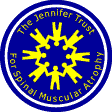The Jennifer Trust for Spinal Muscular Atrophy
 |
Toddling into LanguagePrecocious Language Development
|
 |
Toddling into LanguagePrecocious Language Development
|
With the assistance of the Jennifer Trust for Spinal Muscular Atrophy we have collected data on ten children with SMA-II (intermediate type) aged 18-35 months. All 10 children were able to sit without support and, except for the youngest, feed themselves, build small tower blocks, and hold a pen. None of the children had difficulties with speaking or swallowing. Several were able to stand with leg braces, but not before age 24 months.
The language test used was the British version of the MacArthur Communicative Development Inventory, a parental checklist of a child's language development. The results reveal a particular pattern of language learning in children with SMA:
Young children may say words such as "foots" or "feets" (for "feet"), and "ated" or "eated" (for "ate") even though they have previously learned the same words in their correct form. Children appear to note that most words follow a regular pattern for plurals ("house-houses") or past tenses ("walk-walked"), and to apply this experience as a general rule even to irregular words. For some time they use both correct and incorrect form of the same word side by side. Over-regularisations gradually disappear as the child's language develops further.
Why does this particular advance occur in children with SMA? It cannot be explained by the fact that parents may spend more time with or pay more attention to a child with SMA. Adult language does not contain over-regularisations; these grammatical errors are not picked up from the language environment but produced by the child itself. Also, if children with SMA were overall advantaged for language, this should be seen in all areas of language including vocabulary, and not only in over-regularisations. Paradoxically, early vocabulary learning is slightly delayed in children with SMA, whereas development of grammar, which over-regularisations represent, is accelerated.
Our explanation is that children with SMA explore language in place of a world which they cannot reach, manipulating words and trying out different word-forms where typical toddler activities and interactions with the physical environment are not possible. This specific early linguistic advantage is no longer seen in older children with SMA, since normal children soon catch up. Children affected by SMA maintain and refine, however, their exquisite communication skills and ability to manipulate their social environment.
We would like to thank all the parents and children who participated in this first study; a more detailed study is being planned for the future.
For further information you can write to
Prof. Bencie Woll, Clinical Communications Studies, City University, London EC1V 0HB.HTML by DanE
First published by The Jennifer Trust for Spinal Muscular Atrophy : 2nd June 1998
Latest update : 2nd June 1998